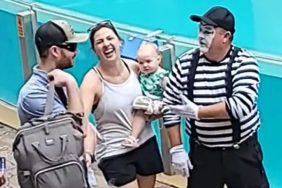I get twitterpated talking to some actors. Usually it’s not the biggest stars. Usually it’s Bruce Greenwood, the star of the cult TV series “Nowhere Man” and Atom Egoyan’s Exotica, one of the best films of the 1990s. He’s got a corker of a role in Robert Zemeckis’s Flight, playing Charlie Anderson, Denzel Washington’s best friend and union representative who deals with a complex moral and ethical quagmire. When your best friend is an alcoholic, do you do everything necessary to get him help or do you fight to keep his secret because his addiction may have contributed to a plane crash that could ruin the airline and destroy the lives of the people whose jobs depend on that silence? We talked about some of the issues raised by the film before reminiscing about some of his earlier roles and discussing why no one on J.J. Abrams’ Star Trek Into Darkness is likely to actually answer any of the online media’s questions about the eagerly awaited sequel.
Flight opens in theaters this Friday, November 2nd.
CraveOnline: Flight took me by surprise. I didn’t realize it was such a “message” film.
Bruce Greenwood: It’s a serious film. I don’t know if it’s really a “message” film. It’s like the film itself says, you get what you come in with is a factor in terms of what you go out with.
I realize now that “flight” in the title is actually meant to be a verb [i.e. “to flee”]. Is that something that attracted you to the project, the film’s focus on alcoholism?
No, what attracted was this… The alcoholism is not something that I have a great deal of personal experience with, so what excited me was all these morally ambiguous choices they made, and depending on the point of view it’s either a moral or an immoral choice, or an ethical choice or an unethical choice. And these characters that, like Charlie Anderson for example, it’s one of his best friends. His best friend looks him in the eye and says, I’ve got it under control. I’ve got it together. On a certain level, Charlie knows his worst fears are true, that he hasn’t got it together. But he lies. Charlie lies to himself enough that he can make the choice to usher Denzel through this process and basically not be his best friend.
And sometimes being someone’s best friend means not doing what they want you to do, too.
Yeah, so you weigh your responsibility to your friend against your responsibility to 1,500 pilots, and 3,000 flight attendants, and a union, and all the families, and you say, honestly, what is the ethical choice here? What’s morally more responsible? Do you sacrifice your friend, and allow him to continue to lie to himself and support that lie, so that the union can carry on and the airline can survive, and all those thousands of people that depend on that, or do you save somebody you love at the expense of all those people that you are supposed to protect? So that’s a slippery slope.
I think the most interesting thing about the way the film handles that plotline is that his alcoholism, the fact that he’s on coke, these things have nothing to do with the accident. It’s incidental. He did end up saving everyone.
Depends on what your point of view is. Did it have nothing…? What, for example, if he had been sober? Would he have chosen to take off in that weather? Or was his level of confidence high because he was in the bag?
That had not occurred to me. That’s interesting.
Right?
Did you talk about these issues with Robert Zemeckis or Denzel?
Yeah, of course. On the job, right? That’s what the movie’s about. It’s about all those choices, and the answer would be different for everybody. The other thing is, what if… if Denzel had chosen not to take that plane off, they had cancelled the flight, he had packed his bags and gone back to the hotel room, had a glass of milk and fallen asleep. And then the next crew that comes in to fly to a different place on that plane, sober, gets in, and the tail screw blows out and that planes crashes and kills everybody aboard? Is there an act of god that chose Denzel, in his inebriation, to be free enough to invert that plane, to save that many people? You can extrapolate, you can go on and on and on and on…
I’m glad you brought up the “act of god” bit, because the film has a tendency to bring up religion in that regard. In regards to AA, that’s a religious institution. What were your thoughts on the film’s religious implications, or is that all subtext?
That’s something for you to consider. I wouldn’t say that the film has a religious point of view.
All of your scenes are with Denzel Washington in this film. Maybe a bit with Don Cheadle…
[Thinks] Yeah.
What is the process like with Denzel? What’s it like playing off of him?
You just listen. He really listens carefully. He’s really present, so you don’t get any sense that he’s manufacturing anything. You look at him, he’s really present, you respond, he responds. Pretty organic really.
Can you tell me everything about Star Trek 2?
Yes, I can.
Oh!
Yes, I can.
Okay, good.
I get to tell you absolutely anything. J.J. in fact called me recently, and texted me too, and just said, “Listen, I want you to tell them.”
Good! You’re the spokesman.
Yeah. I’ll kill you, after.
That’s fair, actually.
Is that right?
It’s common.
I don’t know what you’re talking about.
Did you see that three-frame clip that they showed?
No, I haven’t seen it. I heard about it though.
I imagine people are wheedling you for that.
But they know it’s a mug’s game. They can ask all they want, I’m just going to look at them with a flat face.
It is their job.
But it’s a waste of air!
It is. Isn’t it just?
Because we respect the audience enough. We’re not going to tell. We’re not going to spoil it for them. And we all have enough of a sense of self-preservation not to throw our careers out, you know? [Laughs] You would have to pay me so much.
It would have to be enough to never have to work again.
More! More, because I’d be non grata in the industry. So you’d have to pay for my reputation. I don’t think I could come back to Hollywood with any amount of pay-off money…
Couldn’t get arrested in this town.
I don’t think so. Well, I might get arrested.
Two of my very favorite movies were two that you were in for Atom Egoyan, Exotica and The Sweet Hereafter.
I just finished another one with him.
Which one did you just finish?
The Devil’s Knot.
Tell me about The Devil’s Knot.
That’s the story of the West Memphis Three.
Who do you play in that?
The judge. The judge, yeah. [With] Colin Firth and Reese Witherspoon.
What’s it like coming back and working with him?
Oh, it’s grand. I mean, I’ve known him for 20 years now, so it’s just great.
I did a little research on some of your film work, and I ran across a film I had not seen. I was wondering if you could tell me about The Malibu Bikini Shop?
The interview is over. You’re free to go.
Am I? Is this a problem?
Oh, no, no.
I love that genre, actually, and it’s interesting to talk to an actor who has come from that into such remarkable dramatic roles.
We’re trying to actually do Bikini Shop 2.
Good.
I’m going to reprise the cutoff jeans, and… Yeah. Well, I’m this guy who just got into town, and two weeks later I got that movie and just went, you know. Even after being on the set for two days I called the agent and went, “I’ve changed my mind… and I need to be… I need to be not in this movie.” And she said, “No, no, no, no, no, no… Bruce, is it? No… That’s not the way it works. I don’t know where you’re from…” “Uh, a small town in Canada?” “Well, maybe that explains it. However, you’re in the movie, and you should just carry on.”
It worked out okay, didn’t it?
That movie can be found in bins in Australia, in 7-11’s… I wouldn’t say it’s enjoyed a healthy afterlife, but it occasionally rears its bare backside.
And you seem to be doing fine. You are, I think after Kevin Conroy, one of the best Batmen.
It seems to be Kevin. If I’m completely honest, what I heard is yeah, Kevin he’s the guy. He’s just the guy.
But you were fantastic. Do you go to any conventions for Under the Red Hood or “Young Justice?”
No, I went to Comic Con when Under the Red Hood came out, and that’s where I got the feeling. I mean, people were nice to me, but I think Conroy is still considered the pinnacle.
But you had a really great dramatic role in that. It’s a really emotional Batman story.
Yeah.
What are those productions like? They go straight to video but everyone seems to be investing so much in them.
Well, it’s a very intense few days’ work, I can tell you.
Do you they leave you to your own devices as an actor? Do they tell you to read all these comics…?
No, you just come in. I came in basically cold, and having read the script and thought about the script of course, but in terms of like other comic homework, no. That was the character.
You do reprise the role in “Young Justice,” right?
Yeah, but there’s Batmans and there’s Batmans. The “Young Justice” thing is different. It’s dark but it’s not that dark.
It’s also not about Batman.
No, it certainly isn’t. He’s peripheral.
I love that series.
Yeah, a lot of people do! I just did the video game yesterday.







